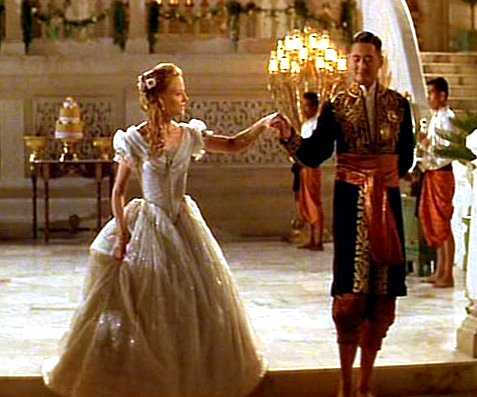Textuality » 4A Interacting
1.
Tuptim's execution is the strongest sequence of the film. Roger Bondelli's editing juxtaposes
the public execution of the lovers with Anna praying in her English home and Mongkut praying
at a temple. Instead of showing the failure of Siamese culture, Tuptim and Mongkut accept
their culture and the consequences of their actions. However, Anna's Bible offers her no solace,
and in her frustration she knocks over her tea service: Christianity isn't without value, but it's
inappropriate in Siam and leads to destruction.

I agree. Tuptim’s execution is the strongest sequence of the film. Only this time, Anna is wrong and fails her goal. She wants to save Tuptim’s life, but in Siam everything has its own time. Anna in this case, didn’t understand when was the exact time to try to save Tuptim. This is the only point in which she failed. Moreover, the king mustn’t seem weak to Siam’s inhabitants. He is the king and he is the symbol of the power, and the symbol of Siam. If he followed what Anna said, he would be badly considered. To keep his power, he has to demonstrate to the population that he does not depend from Anna, neither he as man, nor his decisions. For this reason he ordered Tuptim execution, even if he didn’t really wanted. While. There is a scene in which Mongkut and Anna are represented very far from each other bodily speaking, but emotionally they are really near. As a matter of facts, both are praying, even if they are from different religion.
2.
In this postcolonial retelling of the relationship between the English teacher Anna Leon Owens
and King Mongkut, the film does not make the common mistake of overvaluing or mystifying
Eastern culture. The Siamese are not portrayed as "inscrutable" or "mysterious" or innately
superior. Though the minor English characters are shown as treacherous and hypocritical,
treachery also exists within Siamese culture--and is revealed to Mongkut by a self-serving
English merchant. Buddhism is portrayed neither as pagan superstitions (as in the earlier
movies) nor as more spiritual than Christianity. The respective religions are presented instead
as separate paths. The King is shown to be a caring and loving husband to his many wives and
concubines. When Anna' son, Louis, asks his mother "Why doesn't Queen Victoria have more
than one husband?"--it is less a ridiculous thought than an honest questioning of cultural
assumptions.

I agree with the second consideration. In the film, there isn’t a religion better than the other one. As a matter of fact, both (Anna as Christianity, the king as Buddhism) are in crisis during Tuptim’s execution. Anna and Mongkut, as carriers of their religion, are both intelligent, educated, and they are equal: as a matter of facts, Anna is the only person allowed to stand in front of the king. Moreover, both (Anna and Mongkut) are strongly willed: no one leaves his ideas, his positions, his behavior; even if in contrast with the other culture.